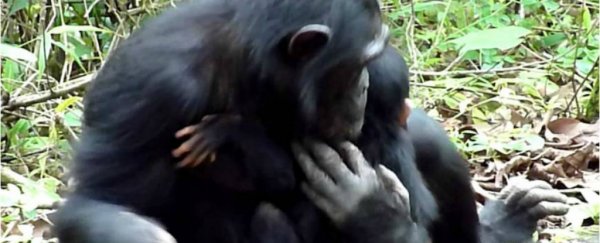In a stark reminder of just how similar chimpanzees and humans are, Japanese researchers have observed a chimp mother taking care of her "severely disabled" infant in the wild. With the help of one of her other daughters, she was able to help the baby survive for almost two years, despite the fact that it couldn't walk on its own.
Prior to this, scientists weren't sure whether chimpanzee mothers would simply leave a disabled juvenile to fend for itself, as other animals are known to do in the wild. But the new observations suggest that, just like humans, they rally together to take care of vulnerable family members.
This is the first time this type of behaviour has been seen in chimpanzees and it could help scientists understand how humans evolved into such social animals.
"One characteristic of human society is that people reasonably take care of the disabled and those in vulnerable positions," one of the researchers, Michio Nakamura from Kyoto University in Japan, told The Japan Times. "It's interesting to observe a chimpanzee looking after a disabled infant in terms of finding out when such sociality occurs, as they are the closest modern species to humans."
Reporting their findings in the journal Primate, the researchers describe that the disabled baby female chimp appeared to be suffering from a condition similar to Down syndrome, and also had spinal damage.
The infant was unable to sit up on her own. She also had weak legs and couldn't latch onto her mother with her feet, as most young chimpanzees can.
The little girl was first spotted in 2011 and was born into a well-studied group of around 60 chimpanzees living in the Mahale Mountains National Park in Tanzania.
The researchers report that none of the other chimps in the group showed any signs of fear or hostility towards the baby, but that the mother only ever let relatives take care of it, and mainly her older daughter.
Impressively, the baby chimp survived for 23 months before it disappeared, presumed dead, in 2013. That might not sound so remarkable, but for an animal in the wild that's unable to walk on its own or gather food, it's very impressive, and it required a lot of sacrifice on the part of her family.
"The mother scooped the infant up and carried her when moving since she would drop without help," said Nakamura. "When breast-feeding, the mother raised the infant to her nipple to feed her."
The older daughter helped out by minding her little sister while their mother ate.
The researchers aren't too sure why the disabled chimp died, but they believe it could be to do with the fact that its older sister had her own baby in November 2012, which would have made it harder for her to help her mum out.
There's also the possibility that the infant died as a result of malnutrition, because she was never seen eating any solid food. Usually chimpanzees around that age will begin to eat fruit and leaves.
Either way, it's promising to know that animals so closely related to us are so kind. Perhaps there's hope for humanity still…
